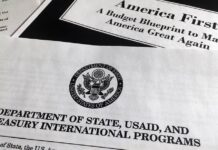The Dickey Amendment has been much vilified in the media over the years, primarily because it was remarkably easy to do so in an era when there wasn’t much in the way of independent media to counter it.
Basically, the law said that the CDC couldn’t use taxpayer dollars to advocate for gun control. That seems perfectly reasonable to me. After all, the right to keep and bear arms is a constitutionally protected civil liberty. The last thing anyone needs is for our tax dollars to go toward an effort to undermine those rights.
The CDC interpreted it to mean they couldn’t do gun research at all. That’s probably because gun researchers (apparently) go into a project with a defined objective, then tailor the data to fit. As a result, they see all their research as anti-gun advocacy, thus a violation of the Dickey Amendment.
That was always on them.
Yet research has resumed at the CDC. The media, however, is still vilifying the amendment while accidentally illustrating why it existed in the first place.
Gun violence is among America’s most deadly and costly public health crises. But unlike other big killers — diseases like cancer and HIV or dangers like automobile crashes and cigarettes — sparse federal money goes to studying gun violence or preventing it.
That’s because of a one-sentence amendment tucked into the 1996 congressional budget bill: “None of the funds made available for injury prevention and control at the Centers for Disease Control and Prevention may be used to advocate or promote gun control.”
Its author was Jay Dickey, an Arkansas Republican who called himself the “point man” for the National Rifle Association on Capitol Hill. And for nearly 25 years the amendment was perceived as a threat and all but paralyzed the CDC’s support and study of gun violence.
Even so, a small group of academics have toiled to document how gun violence courses through American communities with vast and tragic outcomes. Their research provides some light as officials and communities develop policies mostly in the dark. It has also inspired a fresh generation of researchers to enter the field — people who grew up with mass shootings and are now determined to investigate harm from firearms. There is momentum now, in a time of rising gun injury and death, to know more.
The reality is stark:
- Gun sales reached record levels in 2019 and 2020. Shootings soared. In 2021, for the second year, more people died from gun incidents — 48,830 — than in any year on record, according to a Johns Hopkins University analysis of CDC data. Guns became the leading cause of death for children and teens. Suicides accounted for more than half of those deaths, and homicides were linked to 4 in 10.
- Black people are nearly 14 times as likely to die from firearm violence as white people — and guns were responsible for half of all deaths of Black teens ages 15 to 19 in 2021, the data showed.
- Harvard research published in JAMA in 2022 estimated gun injuries translate into economic losses of $557 billion annually, or 2.6% of the U.S. gross domestic product.
- With gun violence touching nearly every corner of the country, surveys show that Americans — whatever their political affiliation or whether they own guns or not — support policies that could reduce violence.
Let’s start with the last point first.
Most of the measures supposedly being advocated for are measures that RAND hasn’t been able to find evidence of them doing a thing to reduce violent crime. Second, I have to question the validity of this study’s findings in the first place. For example, it claims that more than 76 percent of gun owners and more than 60 percent of Republicans favor a permit-to-purchase requirement.
That doesn’t reflect the reality that literally any of us have encountered as members of the gun culture. One could argue that we’re only interacting with more extreme portions of the population, but many pro-gun voices are also active in Republican politics. Where are these advocates of permit-to-purchase requirements there?
It’s hard to believe that there’s a silent majority favoring this particular gun control measure that wants it but refuses to actually say so except to some random researcher.
Next, the Harvard research mentioned talks about economic loss, but it doesn’t factor in the economic savings that exist because good, decent people are able to defend themselves with firearms.
Yes, black people are unfortunately more likely to die from violent crime than white people, and that’s something I think we should address, but by looking at the reasons they are more likely to be killed, which often stems from economic considerations rather than some nebulous gun facts. Additionally, let’s note that the age category where “half of all deaths of black teens” for a moment. Isn’t it funny that it’s also the age category most likely to be involved in gang activity.
Now, that’s not to mean that I’m claiming that most black teens are gang members. I’m not saying anything of the sort. I’m saying that those who are being killed are more likely to be involved in gang activity or targeted by peers who happen to be involved in gang activity which results in more shooting deaths. That gets left out of these discussions way too often.
And finally, we have the first point, and oh. My. God.
First, guns aren’t the leading cause of death for teens. The “study” that claims such a thing omitted infant death data, then included 18- and 19-year-olds, a group no one considers “children” or even “teens,” if we’re being honest. These are legal adults and are also part of that age demographic that’s more likely to be involved in gang activity than someone in their mid-30s.
And let’s also note that while gun sales reached record levels and “shootings soared,” the truth is that gun sales have been over a million per month for about five years now, and we’ve seen remarkable lows in shootings during that exact same time. Further, more than half of all those “gun deaths” are suicides, which have different underlying causes than violent crime.
Yet through all of this, we see something happening.
All of these studies are accepted as valid by the relevant part of the scientific community. Little to none have been rejected by the researchers’ colleagues as bad research. And yet, I can show you the flaws of all of them, how they manipulate the data to show you just what they want people to see rather than reality as it is.
In every case, this is advocacy disguised as research.
The Dickey Amendment was passed to stop the CDC from engaging in advocacy, and if they’d taken a dispassionate approach to the question of gun violence, they could have kept right on looking at it. Yet gun researchers aren’t dispassionate searchers for truth. They’re advocates who want to use your tax dollars to find ways to justify stripping your rights from you.
This is why the Dickey Amendment was passed, and while the media laments its existence, they’re accidentally showing exactly why it was necessary and why it should still be in place.




